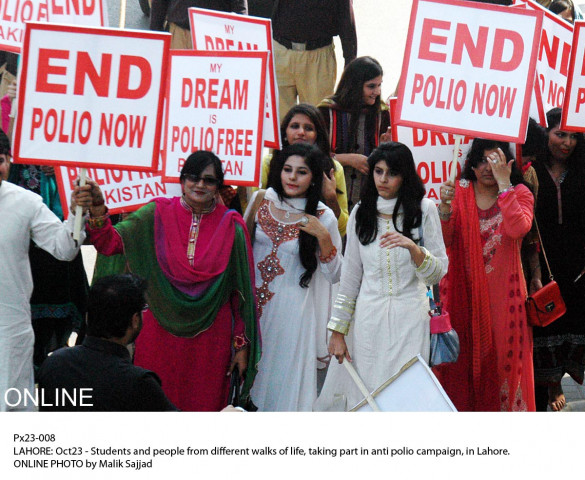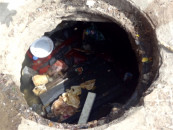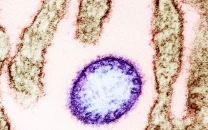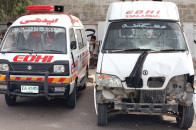Is eradication a long shot?
With more than 85% of the world’s cases, Pakistan stands as the single largest threat

Is eradication a long shot?
With violent attacks on polio teams, 220 cases and a troubling mindset, exactly how far is Pakistan from eradicating polio on this World Polio Day? The country’s Expanded Programme on Immunisation (EPI) estimates it is more than 500,000 children away.
This staggering figure is the number of children who have not been vaccinated each year over the past few years for a number of reasons.

According to EPI National Manager Dr Rana Safdar, these children reside all over the country and unless they are vaccinated, Pakistan stands no chance of eliminating polio.
Remapping strategy
“Some 450 union councils (UC)—10% of the country—are a challenge for vaccinators due to inaccessibility and pose a threat to the entire country,” said Dr Safdar.
He explained the federal government is planning to conduct a micro-census in these UCs to register children under the age of five. Subsequently, during vaccination drives, these children will be called by name to get immunised.
[infogram url="" height="370" width="625"]
WHO Emergency Coordinator for Polio Eradication Elias Durry told The Express Tribune, “Pakistan is going through an explosive polio outbreak with 217 cases reported so far this year. This represents nearly a four-fold increase in the number of cases reported till this time last year.”

Sources: Data from WHO, EPI and news reports.
With more than 85% of the world’s polio cases, Pakistan stands as the largest threat to global polio eradication, said Dr Durry. However, the WHO official maintained the country has the capacity to work toward a polio-free Pakistan by the end of 2015.
“The upcoming six to nine months are critical,” said Durry.
[infogram url="" height="640" width="625"]
Saying no to health
One of the major hurdles Pakistan faces in eliminating the virus is the lack of public trust. Parents’ refusal to vaccinate their children is a big contributory factor to this year’s outbreak in Balochistan which so far has six cases.
Balochistan remained polio free for nearly 20 months, from October 2012 to June this year, when the outbreak began in July.
Three cases each have been recorded from Quetta and Killa Abdullah and all three cases from the latter had a history of vaccination refusal. According to Unicef, during the latest polio drive, at least 19,933 children were not vaccinated because their families refused the polio drops.
[infogram url="" height="590" width="625"]
Quetta-based Communications Specialist for Unicef, Dr Jawahir Habib said, “People ask questions like ‘Why are the government and NGOs more interested in polio and not in other diseases?’” The other reason is the misconception that the drops are a conspiracy against Muslims, added Dr Habib.
As the WHO environment surveillance has found nine positive samples—the virus has found a foothold in the region.
Testing for the virus
The latest WHO environmental surveillance reveals 23 samples collected from Punjab tested positive for the poliovirus, 17 of these were from the provincial capital Lahore.
One case each has been reported from Chakwal, Bhakkar, and Sheikhupura. The cases from Chakwal and Bhakkar were genetically linked to Fata, however, the one from Sheikhupura is genetically linked to Lahore.
Lahore has now been added to the list of the country’s poliovirus transmission zones, said an official of the health department. Dera Ghazi Khan, Lahore, Mianwali, Multan, Muzaffargarh, Rajanpur, Rawalpindi, Rahim Yar Khan, Sahiwal and Toba Tek Singh are among the high-risk areas vulnerable to a polio outbreak.
For more stories on polio attacks, click here
Published in The Express Tribune, October 24th, 2014.



















COMMENTS
Comments are moderated and generally will be posted if they are on-topic and not abusive.
For more information, please see our Comments FAQ